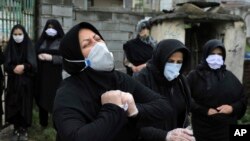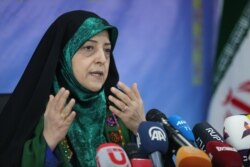A prominent Iranian women’s rights activist says coronavirus lockdowns in the country have fueled cases of domestic violence, mirroring a phenomenon seen in other parts of the world.
In a Wednesday phone interview with VOA Persian from northern Iran, Shahla Entesari said the pandemic has had major adverse impacts on vulnerable Iranian families and poor households.
“Since the people have no relief from the increased stress, it is directed toward other family members, especially women and children,” she said.
The Johns Hopkins University coronavirus website reports that Iran has more than 95,640 infections according to the government's official tally, which some health experts have accused Tehran of deliberately underreporting.
Iran's Islamist rulers shut down much of the economy in March and urged people to stay home to curb the nation's coronavirus outbreak, which has been the largest and deadliest in the region. Declaring the worst of the pandemic to be behind them last month, Iranian officials began allowing economic activities to resume nationwide, while urging citizens to maintain social distancing and other health precautions.
The lockdown has further weakened an Iranian economy in recession since 2018, when the United States began toughening sanctions aimed at pressuring Iran to end perceived malign behaviors. Iranian government mismanagement and corruption have compounded the problem.
An April 10 article by Iranian state news agency IRNA acknowledged that there had been a “dramatic increase” in domestic violence-related phone calls to public social welfare hotlines in the preceding days. It said the increase prompted Iran’s State Welfare Organization to send a text message that day to mobile phone users to widen public awareness of the hotlines.
Iranian Vice President for Women and Family Affairs Masoumeh Ebtekar brought more attention to the issue by tweeting a screen shot of the April 10 text message shortly after it was sent.
The text message said, “If you face any case of domestic violence or child abuse during corona (virus lockdown), call the hotline number 123, which belongs to the Counseling and Psychological Affairs (Department) of the (State) Welfare Organization, to receive social and psychological services for free.”
Two days later, another Iranian official told IRNA that the number of domestic violence-related calls to the hotlines surged again, with callers linking the violence to livelihood problems. Mahmoud Aligoo, head of the State Welfare Organization’s department of social harms, said there had been a doubling of such calls since authorities transmitted the text message.
Iranian authorities have arrested Entesari, the rights activist, multiple times for peacefully expressing opposition to the Islamic republic’s laws discriminating against women. Most recently, she was detained last August and later prosecuted for being one of 14 Iranian women to sign a letter that month calling on Iranian Supreme Leader Ayatollah Ali Khamenei to resign. Entesari has been out on bail since November.
The Iranian incidents of domestic abuse are part of a global trend of surging violence against women and girls during the pandemic, according to an April 28 report by the U.N. Population Fund (UNFPA), the world body’s sexual and reproductive health agency. The study said there have been increased reports of incidents to domestic violence hotlines, crisis centers and justice officials around the world.
In the U.S., an April 5 article by NBC News said 18 out of 22 law enforcement agencies across the country that responded to a request for information reported a rise in domestic violence-related phone calls from the public in March.
The UNFPA study said there were two main ways in which coronavirus lockdowns have fueled domestic violence globally: by disrupting national and local programs to prevent violence and provide services to survivors; and by keeping women and girls inside homes with their abusers as households endure economic turmoil.
This article originated in VOA’s Persian Service. Mehdi Jedinia of VOA’s Extremism Watch Desk contributed.












